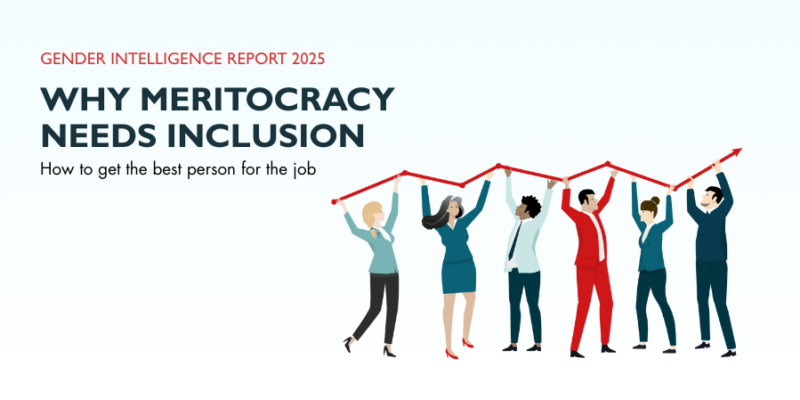
Gender Intelligence Report 2025: Swiss Companies Don’t Always Promote the Best Candidates
Kategorie
BenchmarkingBeitragstyp
ArtikelDieser Beitrag ist auch in Deutsch und verfügbar.
Press Release
The new Gender Intelligence Report 2025 reveals that the notion of fair promotion opportunities is largely a myth in Switzerland – and this could cost companies up to 5 billion Swiss francs. One of the main reasons is the lack of transparency in promotion processes.
Zurich, 18 September 2025 – «We promote the best candidates – it's all about performance and potential.» This belief is widespread in the Swiss economy. However, reality tells a different story: Already at the first promotion level, women are systematically overlooked, despite being equally qualified. This and other findings are presented in the new Gender Intelligence Report by Advance and the University of St. Gallen, launched today in Zurich.
The Reality: Meritocracy Fails Already at the First Management Level
The numbers are clear: While women and men are represented almost equally in non-management positions, the balance starts shifting in the first promotion step. This effect intensifies at higher hierarchical levels.
In six out of eight industries, women are promoted significantly less often than their share of the workforce would suggest. The differences between sectors are particularly striking. The most significant promotion gaps appear in the public sector (17 percentage points difference), consulting (15 percentage points), banking (11 percentage points), and healthcare (9 percentage points). «This is not what meritocracy looks like,» says Dr. Ines Hartmann, Director of the Competence Center for Diversity, Disability, and Inclusion (CCDI) at the University of St. Gallen. «For the merit principle to truly work, we need genuine equal opportunities, objectivity, and transparency in evaluation criteria. Many companies still have significant room for improvement in these areas.»

Chart: Talent pipeline by industry in Switzerland showing the proportion of women in non-management positions compared to the proportion of women at the first promotion level (Gender Intelligence Report 2025)
Employees Demand a Clearer Commitment to Fairness
What do employees expect from their employers? Answers come from a nationwide survey of over 600 professionals across industries and management levels in Switzerland, conducted by Advance and CCDI this spring. 61% of employees surveyed consider commitment to equal opportunities, inclusion, and diversity (DEI) very important – but only 23% feel their employer shares this view. «There's a huge gap between expectations and reality. Employees clearly recognize DEI as key to fairness and meritocratic structures – this builds trust and strengthens loyalty», Hartmann adds.
27% of Survey Participants Consider Changing Employers
The lack of equal opportunities doesn't go without consequences: 27% of employees surveyed would consider switching to a company that is more committed to DEI. Extrapolated to the studied dataset of over 90 companies in Switzerland, this could result in up to 5 billion Swiss francs in turnover costs. «If 56% of female talent don't see fair development opportunities, we're wasting enormous potential», warns Alkistis Petropaki, General Manager at Advance.
The Glass Ceiling Index Speaks Volumes
Companies that consciously focus on equal opportunities and inclusion perform significantly better on the Glass Ceiling Index* (GCI): Advance member companies have an index of 1.8. This means the glass ceiling is thinner than in the comparison group, which shows an index of 2.8. The ideal value is 1. The higher the value, the thicker the glass ceiling for women. There are also significant differences between industries: While the glass ceiling in healthcare is most pronounced with an index of 4.8 despite its high proportion of women, barriers for women to advance into management are significantly lower in pharma and tech (indices of 1.4 and 1.2, respectively).

Chart: Glass Ceiling Index (middle/top management) for the total sample and by industry

Chart: Glass Ceiling Index of Advance members compared to non-member companies.
What Needs to Be Done
The solution lies in what the study authors call "Inclusive Meritocracy": The report provides concrete recommendations for genuine meritocracy to succeed. Here are the top three:
- Make promotion criteria clearly measurable, transparent, and broadly accessible
- Apply objective evaluation procedures combining quantitative and qualitative methods
- Don't automatically consider part-time employees as "unsuitable or unwilling" to be promoted
«DEI isn't about lowering standards or shifting privileges,» explains Hartmann, «but about creating a company culture where people want to contribute, develop, and are able to perform at their best. Only this way can companies ensure they remain innovative and increase productivity.» Leaders play a crucial role in this journey.
The Business Case Is Clear
«Inclusive Meritocracy isn’t a ‘nice-to-have’, but a ‘must-have’», Petropaki summarizes. «Companies that understand this don't just get the best talent – they keep it too.»
The Gender Intelligence Report 2025 is based on the analysis of 376,000 anonymized employee data from over 90 companies (corresponding to about 7% of the Swiss workforce) and an additional survey of over 600 employees in Switzerland.
Further Information
The complete report is available from 18 September, 13:00 at www.advance-hsg-report.ch.
New Company Best Practices
Ten new best practices have been published with this year’s report by the following Advance member companies: ABB, Alpiq, Axpo, DSM Firmenich, KPMG, MSD, SBB, and Swiss Re. The authors are happy to provide further information. You will find their contact details under the respective “Best Practices”, which you can visit here: www.advance-hsg-report.ch/en/best-practices/
Media Contact
Alexandra Rhiner, Communications Manager Advance | alexandra.rhiner@weadvance.ch, Tel. 076 332 85 83
*The Glass Ceiling Index (GCI) indicates whether men and women are represented in management in proportion to their respective shares of the total workforce, or whether they are under- or over-represented. The current GCI of 2.1 for the entire sample indicates that men are 2.1 times more strongly represented in middle and top management than in the workforce.
Das könnte Sie interessieren

HSG Diversity Benchmarking
Das HSG Diversity Benchmarking ist schweizweit der grösste Benchmark im Bereich Diversity, Equity & Inclusion. Unser Ansatz verbindet Wissenschaft mit Praxis - und macht Vielfalt, Chancengerechtigkeit und Inclusion messbar. Mit dem HSG Diversity Benchmarking erhalten Sie als Unternehmen ein strategisches Steuerungsinstrument, das Handlungsfelder erkennen lässt und für Ihre wichtigsten Anspruchsgruppen relevante Ergebnisse liefert.



